The Best Procurement Software
Procurement software helps streamline complex procurement processes for several industries, such as construction, retail, or healthcare. We’ve reviewed top systems for everyone, from small businesses to enterprises.
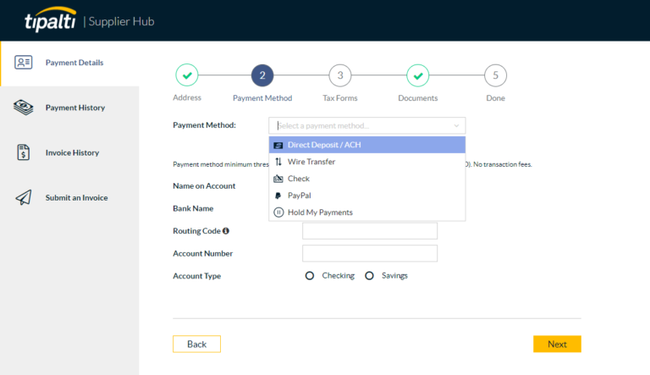
- Integrates with ERP systems
- Secure AWS cloud infrastructure
- SOC2 compliant
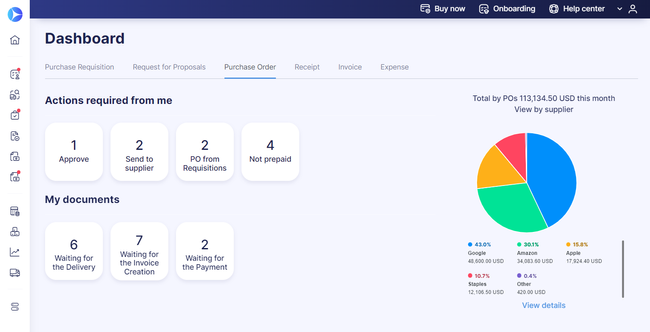
- Simple and straightforward pricing
- Both punchout and Punch-In catalogs
- Integrations for the top accounting systems e.g. QuickBooks Online, NetSuite, Xero
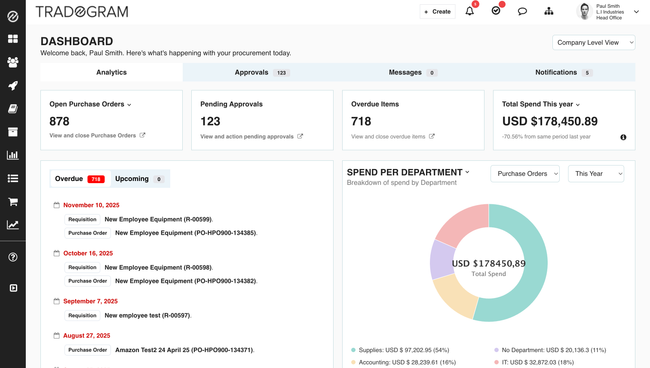
- Offers light budgeting, project, and inventory features
- Integrations for most accounting systems e.g. QuickBooks, NetSuite, Sage, Xero
- Free procurement software for 1 user
The best procurement software supports requisitions, purchase ordering, supplier management, and integration with accounting and inventory control solutions. We’ve reviewed over 25+ products and have narrowed them down to our picks for the best purchasing software:
- Tipalti: Best Overall
- Precoro: Best for Retail Franchises
- Tradogram: Best for Construction Procurement
- Fraxion: Best for Educational Institutions
- Ramp: Best Intake-to-Pay Workflow
- Procurify: Best for Large Businesses
- Coupa: Best Spend Management
- Bellwether: Best for Purchasing and Inventory
- GEP SMART: Best Source to Pay Solution
- Ivalua: Best Analytics Tools
Tipalti - Best Overall
Tipalti offers an automated PO management module that streamlines purchase request processing, approval, and fulfillment. Instead of chasing down emails and spreadsheets, your employees can use customizable intake forms to submit requests with all the necessary details, including items, cost, suppliers, and justification. Tipalti automatically validates the request against your predefined budget controls. This can help you better enforce spending policies and prevent unauthorized purchases before they ever happen.
Approvals often slow down procurement, but Tipalti speeds up the process with rules-based workflows. It routes requests to the right stakeholders based on your company’s policies. Your team can complete approvals via Slack or email instead of logging into a separate system.
Tipalti then auto-generates a PO and sends it to the supplier, reducing the risk of manual data entry errors. Because it supports multi-currency and multi-entity procurement, the system enforces these procurement policies across global teams.
Additionally, Tipalti supports 2-way and 3-way PO matching, cross-referencing invoices, receipts, and purchase orders to prevent overpayments. With built-in compliance checks to flag invoice mismatches or missing approvals, you can prevent costly errors and audit risks down the line.
Precoro - Best for Retail Franchises
Precoro’s optical character recognition (OCR) module auto-extracts key fields from PDFs or images, then maps them directly into your invoice processing workflows. This tightens the feedback loop between purchasing, receiving, and payment. Overall, it’s ideal for retailers operating across multiple locations, eliminating manual entry for thousands of invoices per month.
Precoro’s engine pulls critical details such as:
- Invoice number
- Supplier info
- Issue and due dates
- Line-item details (name, price, quantity)
- Tax breakdowns
- Net/gross totals
From there, it auto-drafts an invoice and even matches it to a related purchase order. This saves your procurement team time on manually pairing the documents. Additionally, Precoro fully supports multi-stage approvals that you can tailor to your finance team’s roles and hierarchy.
Precoro starts at $499/month billed annually. Overall, it’s a solid choice if you’re in retail, hospitality, or nonprofit and struggling with inaccurate invoicing.
Tradogram - Best for Construction Procurement
Tradogram’s vendor performance management module builds evaluation tools directly into your purchasing workflows, letting you see at a glance which construction suppliers are reliable and which cause delays. You start by adding a vendor to the system, including their contact details, services and materials provided, and payment terms. You can even assign them to custom categories like trade or geographic coverage to make it easier to filter and report on them later.
Every time you create a purchase order and that order is fulfilled, Tradogram auto-tracks how each vendor performs. It collects data points like delivery timelines, invoice accuracy, and pricing compliance. These populate into a live vendor scorecard, so you can passively build historical metrics over time. No more manually tracking performance in spreadsheets.
You can even set up custom forms to evaluate vendors after deliveries. For instance, you might have someone fill out a checklist after receiving materials, rating the quality or noting any safety concerns. You can store these audits in the vendor profile, and your team can reference these to filter out suppliers. Tradogram even flags problem vendors and sends alerts before you place another order.
When choosing suppliers for new jobs or renewed contracts, you can get full-cycle visibility into vendor reliability. All plans, including the free tier, support unlimited suppliers; however, you’ll need the paid plan at $375/month to grant access for more than one user.
Fraxion - Best for Educational Institutions
Fraxion’s requisition-to-purchase order module makes it easy for your staff to describe the materials needed, attach supporting quotes, and submit requests through its platform or mobile app. The system instantly checks the requisition against the department’s funds before it proceeds. This real-time budget visibility gives your finance team the confidence that every purchase aligns with approved allocations.
After submitting a request, Fraxion automates the approval chain established by your procurement policy; it routes requisitions to department heads or executive directors as required by category or dollar threshold. Plus, Fraxion records each step in an audit trail for transparency during audits or internal reviews. If an approver receives a request while away from campus, they can review, approve, or reject it via mobile or Microsoft Teams integration.
If approved, Fraxion creates the purchase order and emails it to the relevant vendor; for institutions with preferred supplier agreements, this procurement software can even link directly to supplier catalogs. Once the goods are received, your team can mark receipt through the open PO for a fully traceable, policy-compliant procurement process.
Fraxion starts at $399/month for ten to 25 employees and $749/month for 25 to 100 employees. Schools needing access for more than 100 employees will need a custom quote to get pricing details.
Ramp - Best Intake-to-Pay Workflow
Ramp is one of the most modern platforms on the market, offering an easy intake-to-pay workflow for your procurement team. Employees can simply drag and drop a screenshot of a receipt, and Ramp’s AI parses through the details to create a request form. From there, the system routes purchases through a structured intake flow by first capturing the what, why, vendor, and amount at the moment of request. This makes approvals much faster and more consistent, since the approvers have the context they need right away.
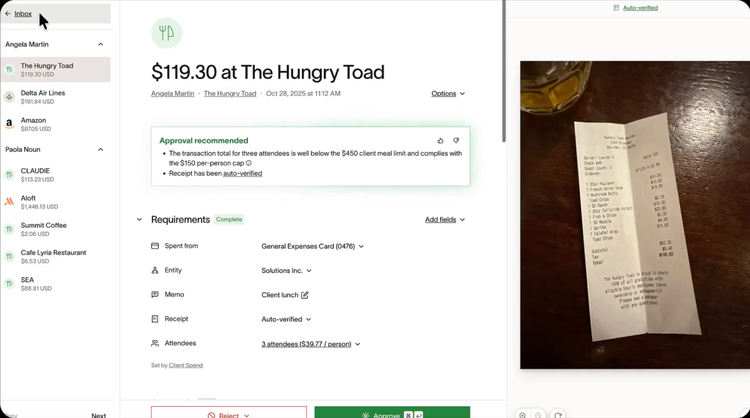
Once your team approves a request, they can convert it to a PO and keep the transaction tied together through the entire invoice and payment lifecycle. This helps prevent duplicate purchases, reduces invoice surprises, and supports tighter AP controls. This results in a much more efficient three-way matching process that’s easier to govern to ensure compliance. It’s also an effective way to cut down on overbills and track your committed spend.
Ramp is a total spend management platform, offering corporate cards, expense tracking, procurement, and automation. It’s a great option for startups and midmarket businesses that need tighter financial control and faster procurement workflows. The Plus plan starts at $15/user/month, though the procurement module is an add-on for this plan.
Procurify - Best for Large Businesses
Procurify is a procurement software that works hard to reduce approval bottlenecks in the procurement process. Features include approval routing, three-way matching, user role controls, expense tracking, cost allocation, and web and mobile access. Procurify is built for companies with 20-500 employees and has a set-up time of as little as two weeks.
Coupa - Best Spend Management
Coupa Procurement excels in spend management through its advanced spend analysis and procurement analysis tools. Its strengths lie in providing deep insights into spending patterns, streamlining the procurement process, and ensuring budget compliance. The software integrates seamlessly with existing financial systems and offers a user-friendly interface, making it accessible and efficient for managing organizational spending.
Coupa provides a comprehensive procurement solution, but it may not be suitable for smaller organizations and those with limited technical expertise due to its complexity and cost. However, businesses looking to optimize their spend management practices can benefit from Coupa’s cloud-based platform, which enhances flexibility and accessibility.
Bellwether - Best for Purchasing and Inventory
Bellwether is a notable procurement software, particularly favored for its user-friendliness and efficient purchasing and inventory management. It’s designed to automate purchasing, improve transparency, and provide a comprehensive solution for small to mid-size businesses.
Users commend its ease of use, role-based access control, and secure cloud infrastructure, which enhances its appeal for companies looking to streamline their procurement processes. However, some users have pointed out a desire for more advanced inventory management features.
Despite these aspects, Bellwether’s affordability and ability to simplify and centralize purchasing processes make it a strong contender in the procurement software market.
GEP SMART - Best Source to Pay Solution
GEP SMART is a cloud-based software designed for medium to large organizations to enhance their source-to-pay processes. It specializes in global sourcing, providing access to a wide range of suppliers worldwide and offering tools for detailed supplier analysis and comparison. The platform excels by centralizing supplier information, performance, and compliance. It offers analytics for monitoring acquisition costs and identifying cost-saving opportunities.
GEP SMART might not be suitable for small businesses or startups due to its complexity and the scale of features offered, which are more aligned with the needs of larger organizations with intricate procurement processes.
Ivalua - Best Analytics Tools
Ivalua’s advanced analytics module helps enterprise companies view detailed data insights. The module includes a library of predefined reports, including supplier risk and performance, spend analysis, contract lifecycle, and compliance. This is especially useful for companies requiring data consolidation across several locations and departments.
Ivalua’s analytics module is also customizable, so you can generate custom reports and monitor target KPIs to tailor the analysis to the most important data. This allows you to monitor potential pain points in specific contracts or better understand the impact of a new sourcing strategy.
Additionally, the comprehensive spend analysis tool lets you identify and predict spending trends. You can use AI and machine learning models to forecast procurement demand, market trends, and risk across the entire supply chain. This helps procurement teams make informed decisions and proactively adjust company-wide or interdepartmental purchasing trends.
Ivalua’s spend analysis is effective for enterprises with global operations, offering multi-currency and language support. The platform has localization capabilities and compliance with international regulations, helping you analyze spending and manage suppliers within different markets.
What Is Procurement Software?
Procurement software helps organizations automate, streamline, and optimize their procurement processes. It enables businesses to manage purchasing activities, from requisition to payment, more efficiently and cost-effectively. Procurement software solutions can assist in managing supplier relationships, tracking inventory levels, and automating the procurement approval process. Additionally, it can provide insights into procurement spend, identify cost-saving opportunities, and help organizations make informed purchasing decisions.
Also known as e-procurement or purchase order software, you can ensure every order your company makes is legitimate, authorized, and trackable. And by linking your procurement solution to inventory control, you can access exact real-time stock quantities, movement history, seasonal trends, and supplier lead times.
The most popular, cloud-based e-procurements platforms are made up of varying functionalities to improve your purchasing workflow, such as:
- Purchase to Pay
- Strategic Sourcing
- Supplier Management
- Contract Management
- Spend Analysis
- Order Management
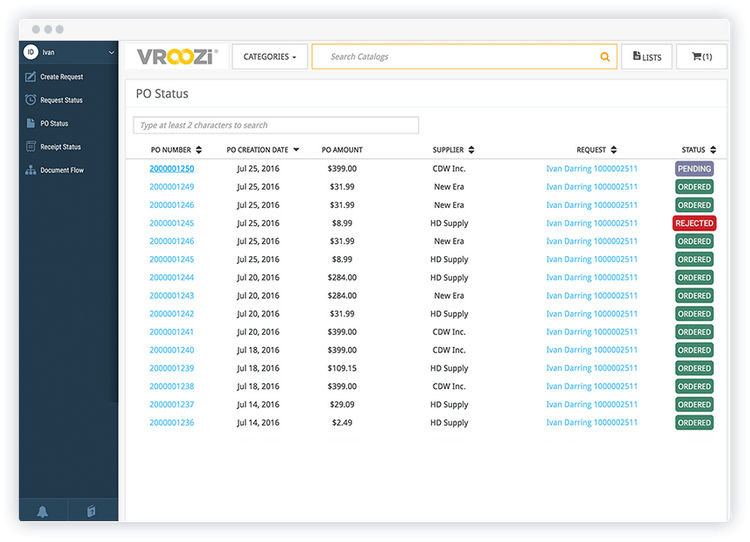
Key Features
| Feature | Functionality |
|---|---|
| PO creation and tracking | Use templates to create purchasing documentation for both internal tracking purposes and communication with suppliers; use reporting data for order management |
| Requisitions and approvals management | Requisition systems improve cost control efforts by formalizing a purchase review process |
| PO/invoice processing | Automated tools assist in the matching of vendor-issued invoices to the corresponding procurement order, providing an important cost control safeguard |
| Receiving management | Receiving management functionality provides tools for verifying that goods have been properly resolved and puts in place workflows that allow for the timely resolution of instances where items are not received on time, in proper condition, or at all |
| Supplier management | Vendor database functionalities allow for the tracking of payment and service terms alongside vendor order histories |
| Automatic or recurring purchase orders | Support for recurring purchases enables the creation of procurement orders in the future when particular conditions have been met and provides a means of significantly decreasing the labor associated with authorizing purchasing events |
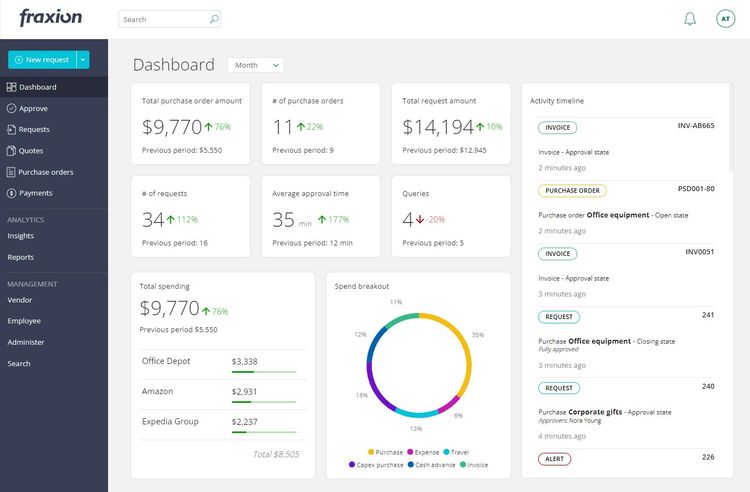
Benefits
Is your supply chain as efficient and accurate as you’d like? Without procurement software, you may be missing an opportunity to ensure faster delivery times, economies of scale, better efficiency, and lower overall costs. Critical supply chain benefits enabled by e-procurement software include:
- Improved cost control via authorizations and approvals
- Reduced supply costs by comparing vendor options and building supplier relationships
- Increased customer satisfaction through timely fulfillment of purchase orders
- Reduction in the time-consuming administrative labor associated with purchasing activities
Provide Critical Documentation
Most people wouldn’t enter into a legal agreement without a contract to protect their interests. Utilizing procurement software allows you to identify instances where your purchase orders haven’t been properly fulfilled. In addition to promoting organization and efficiency, accurate procurement records provide the documentation you need for recourse if your expectations as a buyer are not met.
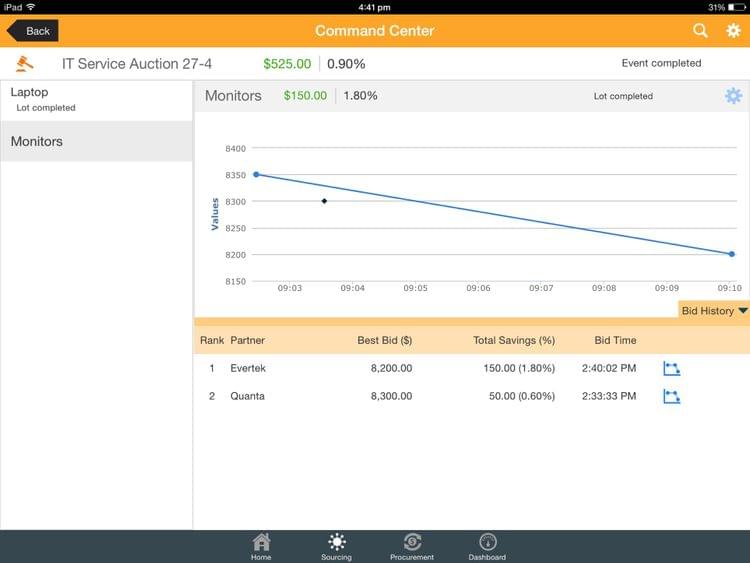
Automate the Purchasing Process
Cloud-based procurement solutions allow you to effectively and consistently manage your purchasing processes. Each order you create is automatically added to the database for future reference. Automation also allows you to streamline the task of creating orders. It’s easy to overlook how much time this can save you. Setting up required fields lets you know that each order contains trackable information on the vendor, items purchased, quantities, delivery instructions, terms, originating buyer, and costs.
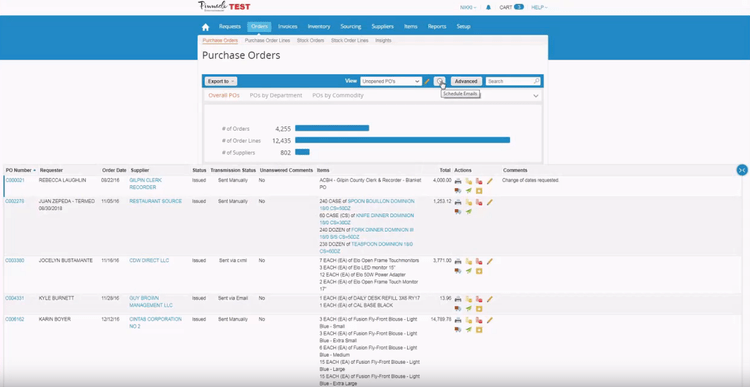
Enhance Accountability
Procurement software adds security and accountability to your ordering processes. Rules can be created authorizing who on your procurement team can make purchases. Centralized purchasing records with spend analysis tools let you track any purchase your company has made. You can ensure that each order is legitimate, accurate, and authorized. Comparing vendor invoices to your own documentation enables you to eliminate vendor payment errors before cutting the check.
Meet Customer Demands Quicker
Automating purchase order creation is also an effective way to meet customer demands along the supply chain. Integrating a user-friendly module with inventory management allows you to do away with the inexact and error-prone practice of “eyeballing the shelves.” By linking your purchase order application to your inventory control application, you will have real-time access to your exact stock quantities, movement history, seasonal trends, and supplier lead times.
Pricing Guide
The cost of e-procurement software ranges from $3,000 to over $150,000 per year:
- Entry-level solutions support 1-25 employees and cost between $3,000 and $15,000 annually. Tradogram, Precoro, and ProcureDesk are popular systems for smaller businesses.
- Mid-tier platforms serve companies with 25-150 employees and range from $15,000 to $45,000 per year. Examples include Procurify, Kissflow Procurement, and Tipalti.
- High-tier tools cover 150-500 employees and cost between $45,000 and $150,000 annually. Platforms for larger companies include Coupa Procurement, Ivalua, and GEP SMART.
- Enterprise systems support over 500 employees and generally start $150,000+ per year. Examples include Oracle Procurement Cloud, JAGGAER One, and SAP Ariba.
The total price for software will depend on the number of users and the level of access they need. For example, an administrative user will receive purchase requests from employees, create and send purchase orders to vendors, and coordinate the accounting involved with tracking these expenses in the budget.
A “simple user” may be a staff member who needs the ability to submit a purchase request. This could include an employee on the inventory floor who notices the company running low on a commonly used item.
There are also on-premise options, with one-time perpetual licenses ranging between $3,000 and $500,000. These procurement management solutions will be owned by the company purchasing them and thus have no ongoing subscription costs. As such, purchasing software directly can actually save your company money over time. There may be ongoing costs for support or annual updates to the software.
How to Choose Software
When choosing the right purchasing software, consider these factors:
Involve Stakeholders
- Consult with stakeholders like procurement teams, finance, IT, and department heads early on in the selection process.
- If your business has budget constraints, ask finance leaders to evaluate cost-effective options. Consider cloud-based procurement software with subscription pricing to lower upfront costs.
Ensure the Software Meets Institutional Goals
Find a system that optimizes your operational requirements, whether that’s streamlining supply chain processes, improving cost efficiency, or maintaining compliance. Ensure that it meets key procurement functions like:
- Vendor management for maintaining supplier relationships
- Purchase approvals to help properly review requests before committing funds
- Order tracking for visibility into purchase status and delivery timelines
Review Key Features
Opt for a system that offers control and efficiency through the following:
- Requisitions and approvals: Ensures purchase requests follow your policies before approval.
- Automated purchase orders: Simplifies converting approved requisitions into POs without your manual input.
- Real-time spend visibility: Lets you track procurement activity across all departments.
- Resource allocation tools: Provides budget tracking and spend controls to support responsible purchasing.
- Streamlined procurement processes: Leverages automated procurement workflows to manage purchases from request to payment.

Types of Procurement Software
Procurement often overlaps with other business elements, such as budgeting. In fact, many companies rely on enterprise resource planning (ERP) or supply chain management solutions to simplify their procurement. Each offers many ways to streamline business processes, yet do not fully focus on the complexities of purchasing.
Depending on what functionality your business has, you may be looking for:
- Purchase order software
- Procurement software
- Procure-to-pay software
- Spend management software
What is the difference between procurement software and the rest? Many software vendors may interchange the names or consider their software to fall under two or more types. While similar in functionality, they all can serve a distinct purpose, which makes it important to know what your business needs. If you’re not sure, ask for a free software recommendation from our experts.
Purchase Order Software
Purchase orders are the financial documents issued to vendors when you’re buying goods or services. Purchase orders are the core of every procurement software and procure-to-pay software. Purchase order (PO) software helps automate the creation of these documents.
While it’s true that every procurement software can create purchase orders, not every purchase order software will have a procurement process built right in. Due to this, PO solutions may be considered more simplistic in nature than a procurement system.
Some PO software has an approval and requisition process, which in turn includes procurement processes. This is why people and businesses commonly interchange the names.
Procure-to-Pay Software
A procure to pay software manages all aspects of a business’s procurement process, which includes requisitions, purchasing, receiving, paying, and proper accounting for received goods and services. There is little difference between procurement software and this software, as they both provide the necessary functionalities to manage a procurement process.
It can be argued that procure-to-pay software is more of an “end-to-end” solution that goes a step further than e-procurement software, as it manages supply chain management practices company-wide. This is because procure-to-pay software is known as the link between the purchasing department and the accounts payable department. This link can provide spend analysis on your company’s buying habits, which will lead to improved cash flow.
Does QuickBooks Handle Procurement?
While QuickBooks products (such as QuickBooks Online) are popular for handling most accounting tasks a business needs, purchase requisition and purchase approval workflow functionality are not built into the base package. It also does not include vendor catalogs, supplier performance tracking, and budgets and spending plans related to a company’s purchasing.
For some businesses, QuickBooks’s PO functionality will meet their needs. For others, third-party add-ons are available, which let you continue to use QuickBooks as your primary accounting software while enjoying added tools for procurement and spend management.






































































